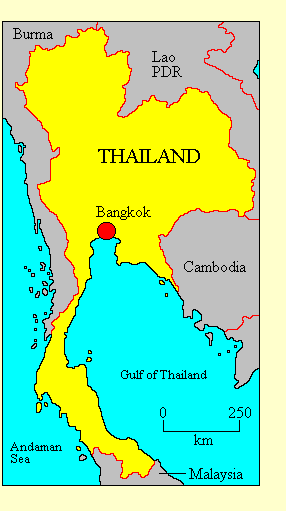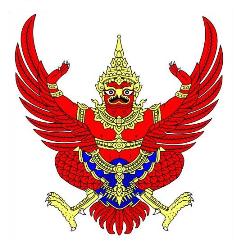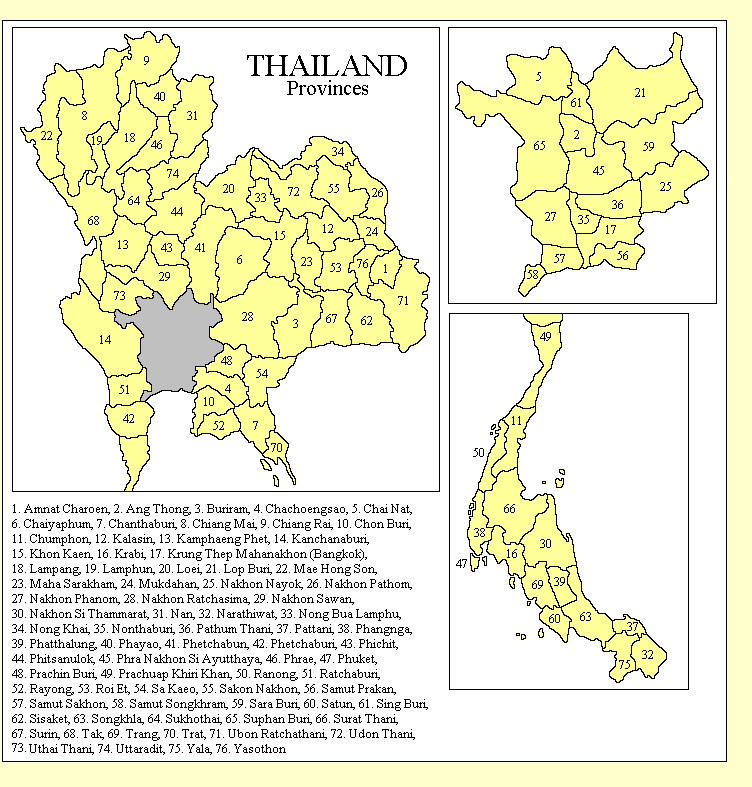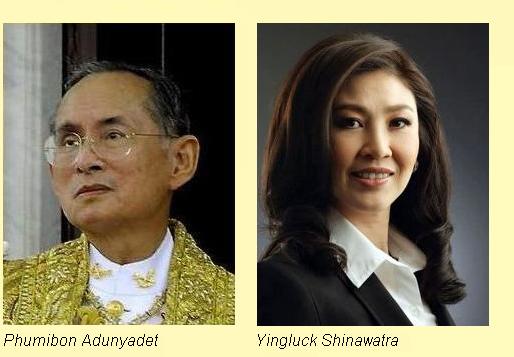

KINGDOM OF THAILAND
• Official name: Prathet Thai (Kingdom of Thailand)
• Location: South East Asia
• International organisations: Asia-Pacific Economic Co-operation Forum, Association of South
East Asian Nations, Non-Aligned Movement, United Nations, World Trade Organisation
• Borders: Burma, Cambodia, Lao PDR, Malaysia
• Coastline: Andaman Sea, Gulf of Thailand
• Land area: 514,000 Km2
• Population: 63,400,000
• Annual GDP (PPP) per capita: US$8,100 (2009 CIA estimate). World ranking: 95
• Ethnicity: The majority of the population idenify as Thai even
if Thai is not their first language. There are minorities of Lao,
Chinese, Malay and Khmer.
• Languages: Thai is the official language, but only 53% speak it as
their first language. Minority languages include Lao (usually known as Isan in Thailand) 27%, Chinese 12%, Malay 3.7%,
Khmer 2.7%.
• Religion: Buddhism, though not officially the state religion, carries the prestigious patronage of the King and
is actively practised by most of the population. Islam 3.8%, Christianity 0.5%, Hinduism 0.1%
• Form of government: Semi-constitutional monarchy, limited parliamentary democracy (puncuated by periods
of military rule). Thailand is divided into 76 provinces.
• Capital: Bangkok (Krung Thep)
• Constitution: Thailand has had 18 constitutions. The current
Constitution of Thailand was approved by the people at a referendum on 19 August 2007, and signed by the
King on 24 August 2007.
• Head of state: King Phumiphon Adunyadet
came to the throne on 9 June 1946. He is the world's longest-serving current head of state. The King is
advised by a powerful Privy Council whose members he appoints.

• Head of government: The Prime Minister appointed by the King. The Prime Minister is normally the leader of the
largest party in the legislature, to which he is accountable. The reality of Thai politics is that the Prime
Minister must also be acceptable to the King and his advisors.
• Legislature: The National Assembly (Ratha Sapha) is a bicameral legislature. The House of
Representatives (Saphaputhan Ratsadon) has 480 members, elected for four-year terms. Of
these, 400 members are elected from multi-members constituencies and
80 members are elected by proportional representation. The Senate (Wuthisapha), a non-partisan chamber,
has 150 members: 76 are elected and 74 are appointed by a committee of judges and members of independent
government bodies.
• Electoral authority: The Election Commission of Thailand
conducts national elections.
• Freedom House 2011 rating: Political Rights 5, Civil Liberties 4
• Transparency International Corruption Index: 35% (78 of 178 countries rated)
• Reporters Without Borders Press Freedom 2010 Index: 43.2% (153 of 178 countries rated)
• Heritage Foundation Economic Freedom 2010 Index: 64.7% (62 of 179 countries rated)
Political history
Thailand, a united kingdom since the 13th century, was an absolute
monarchy until 1932, when an army coup led to the adoption of a
western system of government. Real power, however, was held by the
army. The military
government was allied with Japan 1941-44, and in 1944, to avoid Allied
occupation, it resigned and allowed the democratic opposition to
come to power. The army returned to power after another coup in 1947. There were
further coups in 1948, 1951, 1957 and 1959, preventing every attempt
by the democratic parties to establish a stable civilian
government.
In 1973 the long-serving military ruler Thanom Kittakachorn
retired and there was a return to democratic government. But in 1976
another, much more bloody, coup returned the army to power under
Thanin Kraivixien and his successors Kriangsak Chomanan and Prem
Tinsulanonda. In 1988 there was another return to civilian government under
Chatichai Choonhavan, followed by the inevitable coup in 1991. But
this time the people of Thailand had had enough, and the army's
attempt to impose Suchinda Kraprayoon as Prime Minister led to a
popular revolt in Bangkok in which many people died.
Intervention by the King led to the withdrawal of the army
from politics and promulgation of a fully democratic constitution in
1997. Under Prime Minister Chuan Leekpai there was considerable
economic and political progress, but Thailand was hard-hit by the
economic crisis of 1997. Disillusionment with existing political options led to the
triumph of businessman Thaksin Shinawatra and his populist Thais Love Thais (TRT) party at
the 2000 elections. The older parties, the liberal
Democratic Party of Chuan
Leekpai and the
conservative Thai Nation Party,
were heavily defeated. Thaksin had an even more sweeping election victory in early 2005, but
he then became mired in corruption scandals and his popularity declined. An snap election in April 2006 was
boycotted by the opposition, leading to a prolonged political crisis culminating in a military coup in September
2006, which was carried out with the tacit approval of the King.

The military regime of General Sonthi Boonyaratkalin was fairly mild and soon handed
over power to a civilian prime minister, Surayud Chulanont. Fresh elections were held in December 2007. Despite
the best efforts of the palace and the military, the People's Power Party (PPP), supporters of the exiled Thaksin,
emerged as the largest party. The Palace, representing the Bangkok elite, was determined not to accept this, and
two successive PPP prime ministers, Samak Sundaravej and Somchai Wongsawat, were
forced out of office on spurious legal grounds after scenes of orchestrated mob violence in Bangkok.
In December 2008, in what amounted to a "soft coup",
the palace engineered the defection of a PPP faction led by Newin Chidchob, whose support allowed the Democratic Party
leader, Abhisit Vejjajiva, to form a ministry despite having lost an election only a year before. These events made it
clear that the real centres of
power in Thailand were still the King and his Privy Council (headed by former military ruler Prem
Tinsulanonda), and the military.
In 2010 widespread violence broke out in Bangkok when the military attacked pro-Thaksin demonstrators. This
produced a backlash against Abhisit's government, and at elections in July 2011, the Democrats were easily defeated by the
new For Thais party, led by Thaksin's sister
Yingluck Shinawatra. This was the fifth
successive election victory for Thaksin and his surrogates. Yingluck became Thailand's first female
prime minister. It remains to be seen whether the Palace and the Army will allow her
government to govern, or whether they will again collude to frustrate the will of the electorate.
Freedom House's 2011 report on
Thailand (which was written before the 2011 election)
says: "Thailand is not an electoral democracy. The most recent national parliamentary elections in December 2007
proceeded without major disruptions and returned Thailand to civilian rule following the 2006
military coup, but they were not free and fair. The military retained significant influence, and
martial law was in effect in 25 provinces at the time of the elections. The CNS maintained tight
control over the electoral process and deliberately maneuvered to influence the outcome against
the PPP. Moreover, the PPP-led government that emerged from the voting was toppled in December
2008 in what many observers regarded as a judicial coup... The current constitution was drafted
under the supervision of the military-backed government and approved in an August 2007 referendum...
The CNS-appointed interim legislature passed the Internal Security Act (ISA) shortly before the
2007 elections. The law created an Internal Security Operations Command (ISOC), headed by the
prime minister and the army chief, which retains the authority to override civilian administration
and restrict basic civil liberties to suppress disorder, even without a formal state of
emergency... Corruption is widespread at all levels of Thai society... The 2007 constitution
restored freedom of expression guarantees that were eliminated by the 2006 coup [but]
The government and military control licensing and transmission for Thailand's six main television stations
and all 525 radio frequencies... The 2007 constitution restored judicial independence and
reestablished an independent Constitutional Court [but] the Thai courts have played a decisive
role in determining the outcome of political disputes [and] a series of rulings in 2008 brought down the elected PPP government
and cleared the way for Abhisit to take power."
Updated November 2011
|

